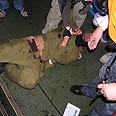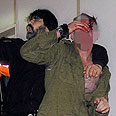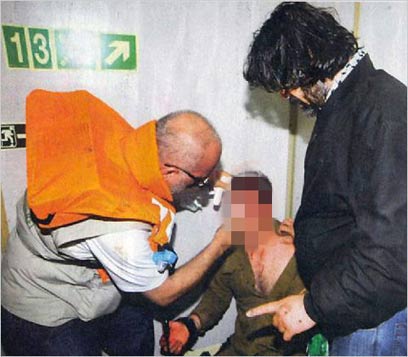
'No one sustained fatal injuries'
Photo: AFP

Injured commando on the Mavi Marmara
Photo: Reuters
Turkish doctor who treated soldiers says more humane
Dr. Hasan Huseyin Uysal treats three commando soldiers wounded during raid on Mavi Marmara. In interview with New York Times, he claims soldiers' wounds were superficial and fact that he treated them diligently proves that flotilla passengers had no plans to kill
Israeli and Turkish accounts of what happened on the Mavi Marmara continue to clash. Turkish doctor, Dr. Hasan Huseyin Uysal, recounts in an interview with the New York Times how he treated three Israeli commandos wounded during their take over of the Mavi Marmara that was part of the international flotilla that sought to break the blockade on the Gaza Strip.
Ali Abunimah, founder of the pro-Palestinian website Electronic Intifada, argued in a post that photos documenting the medical treatment provide the IDF soldiers proves that the activists who took part in the flotilla did not plan on killing the soldiers, as Israel has claimed.
Telling Our Story
Aviel Magnezi
Prime minister wants international community to hear answers to difficult questions; insists IDF soldiers are not investigated
Dr. Uysal denied in the interview that the activists sought to harm the soldiers, and claimed that they only sustained superficial wounds from the clashes. "If people on board were so eager to hurt them, why would they not just shoot them to death once they had taken their guns? Why bother carting them inside for treatment? It just doesn’t add up," he said.

Dr. Uysal treating an Israeli commando onboard the Mavi Marmara (Photo: IHH/Flickr)
The Turkish doctor said that he treated the Israelis' wounds as the bodies of the activists they killed lay beside him.
"I had our dead bodies and injured people lying in front of me and I was treating the soldiers that actually killed and wounded them. None of our friends in the center approached to harm or hurt them. Our injured people were lying on the ground, but I rested the soldiers on our chairs," he said.
Dr. Uysal explained, "None of the soldiers had any fatal wounds that would cause organ loss or defects. There were scratches on their faces, but since facial skin is sensitive and very likely to bleed in any trauma, there was blood on their faces – which I cleaned carefully to see what kind of injuries they had. In the end, they happened to be only scratches."
'We didn't even have stitching equipment'
Nonetheless, the Turkish doctor admitted that one of the soldiers sustained a slightly more serious injury.
"The third soldier, however, suffered a cut in his stomach that reached his stomach membrane but not the organ itself. It was nothing fatal. As a doctor, I wouldn’t want to guess the nature of this injury but it could have been caused by either landing on a sharp pole from the helicopter or a blow from a pipe with a sharp edge. I couldn’t tell," he recounted.
"In either case, it was not fatal but it had to be stitched. However, since we did not ever expect such a confrontation, we had not brought any stitching equipment on board. All we had was simple medical material to dress simple wounds, or drops to ease burning in case tear gas was used. If I had stitching material with me, although I am an eye doctor, I would have treated the boy properly in accordance with my general medical knowledge. I couldn’t."
Dr. Uysal said that the tried to calm the soldiers, who seemed "very startled and very scared."
He said that he tried to explain to the soldiers in his broken English that he was a doctor and did not wish to harm them. He said that he and his shipmates "could have left them to their fate, but this is not the humanity that we act with."
"We asked photographers not to film in the medical center and I have no idea how and when that picture was taken but God never leaves good deeds unheard. That picture shows the difference between the Israelis and us," he said.















